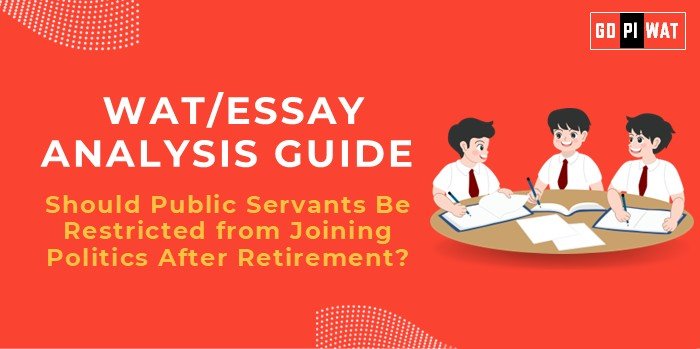📋 Written Ability Test (WAT)/Essay Analysis Guide
🌟 Topic: Should Public Servants Be Restricted from Joining Politics After Retirement?
🌐 Understanding the Topic’s Importance
This topic aligns with key themes in governance ethics, transparency, and stakeholder management. For B-school aspirants, it presents an opportunity to critically examine leadership challenges, ethical frameworks, and policymaking strategies in the transition from public service to political roles.
🕒 Effective Planning and Writing
- Time Allocation:
- Planning: 5 minutes
- Writing: 20 minutes
- Review: 5 minutes
- Preparation Tips:
- Highlight global practices regarding cooling-off periods for public officials.
- Use recent trends and data from Indian governance and politics to provide context.
- Include ethical considerations and stakeholder impacts to strengthen arguments.
✨ Introduction Techniques for Essays
- Contrast Approach: “While 66% of countries enforce cooling-off periods for public officials, India’s regulatory framework remains fragmented, fueling debates on governance integrity and ethical transitions.”
- Solution-Based Introduction: “Adopting globally aligned cooling-off regulations can ensure that retired officials contribute meaningfully to politics while safeguarding public trust and democratic fairness.”
📚 Structuring the Essay Body
🏆 Achievements:
- Strengthened Governance: Retired public servants often bring in-depth knowledge of policymaking and public administration, contributing to effective governance.
- Legislative Efficiency: Their expertise in administrative processes enhances the quality of debate and policy execution in legislative roles.
⚠️ Challenges:
- Ethical Concerns: Immediate entry into politics can compromise the perceived impartiality of the bureaucracy, affecting public trust.
- Insider Information Risks: The potential misuse of sensitive information gained during public service raises serious ethical questions.
🔮 Future Outlook:
- Uniform Enforcement: Establish standardized cooling-off periods across all public service roles to mitigate conflicts of interest.
- Transparent Frameworks: Implementation of clear guidelines and monitoring mechanisms for transitioning into politics, ensuring fairness and public accountability.
🔗 Concluding Effectively
- Balanced Approach: “Cooling-off periods provide a balanced solution to maintain governance integrity while allowing retired officials to contribute their expertise to the political domain.”
- Global Comparison Conclusion: “By adopting best practices from countries with successful cooling-off period policies, India can enhance its democratic structure and ensure inclusive governance.”
💡 Recommendations for Sustainable Progress
- Implement Standardized Cooling-Off Periods: Introduce a mandatory and uniform cooling-off period across all public service roles before transitioning into politics. This duration can vary based on the role’s sensitivity, ranging from two to five years.
- Enhance Transparency and Monitoring: Develop a framework requiring retired public servants to disclose political affiliations and post-retirement activities, monitored by a regulatory body.
- Leverage Advisory Roles: Establish channels for retired officials to contribute expertise without directly entering politics, such as policy advisory roles.
- Adopt Global Best Practices: Customize practices like Singapore’s and the US’s cooling-off regulations to suit India’s needs.
- Promote Ethical Leadership Training: Include modules on ethical decision-making in civil service training programs to prepare officials for post-retirement opportunities responsibly.
📝 Sample Short Essays
Balanced Perspective:
“Cooling-off periods for public servants transitioning to politics ensure ethical governance while leveraging their expertise, creating a balance between experience and impartiality.”
Solution-Oriented:
“Structured regulations combined with transparent monitoring mechanisms can address ethical concerns, enabling a smoother transition of retired officials into politics.”
Global Comparison:
“India can draw inspiration from global practices, such as the US’s lobbying restrictions, to establish ethical frameworks for retired public servants entering politics.”


